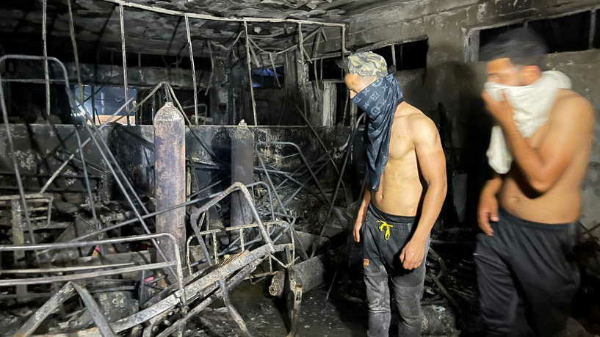Iraqi Government Steps Following Ibn Al-Khatib Hospital Fire Are Not Enough

Dozens of patients died in a fire that broke out in a hospital designated for COVID-19 patients in the Iraqi capital Baghdad, the Euro-Mediterranean Human Rights Monitor said in statement today, calling on the Iraqi government to open an urgent and transparent investigation into the incident.
The fire at Ibn Al-Khatib Hospital in the Diyala Bridge area, southeast of the capital, killed 82 people and injured more than 110 others last Saturday night, according to a statement made by the Iraqi Interior Ministry.
The statement said an oxygen cylinder in one
of the hospital's upper floors exploded and the fire
expanded aggressively due to a lack of firefighting systems
in the hospital.
Local medical sources confirmed the
explosion was due to non-compliance with the safety measures
and procedures related to storing oxygen cylinders, which
were stored in places containing heat sources that in turn
led to this explosion.
Many of the victims suffocated
as oxygen supplies to patients on the ventilators were
disturbed after the fire broke out, while others were
asphyxiated from excessive smoke inhalation . Some patients
were seen jumping from the windows to escape the
flames.
An eyewitness told Euro-Med Monitor: “We were
next to the hospital when the fire broke out. We rushed to
the hospital and tried to put out the fire, but we could
not. The fire was spreading very quickly to other areas. We
waited for half an hour for the civil defense teams to
come”.
“We took out a number of dead bodies from inside the burning building, but we could not identify them because they were severely burnt,” he added.
Ibn Al-Khatib Hospital is an old hospital in Baghdad that lacks adequate safety and security equipment. The hospital does not have a fire-fighting system or sensors to detect fires at an early stage. In addition, the ceilings of the hospital contained highly flammable cork materials which hastened the spread of the fire.
A woman accompanying her mother, who was a COVID-19 patient, said to Euro-Med Monitor: “I was with my mother on the second floor, where she was getting oxygen through the hospital’s medical gas supply. After breakfast (around 7 p.m.), we heard a loud explosion that shattered the windows and shook the entire building, and smoke started filling the place.
We evacuated the
hospital with the help young men who entered the building
and rescued the injured. My mother lost oxygen while
walking. We were afraid for her life.
The fire incident
is not the first of its kind. A fire had erupted at Al-Furat
Hospital, west of Baghdad, in June 2020 in the quarantine
rooms designated for COVID-19 patients. The fire caused
severe material losses.
The Iraqi Council of Ministers decided after an emergency session to suspend the Minister of Health, the Governor of Baghdad, and the Director of Al-Rusafa Health Directorate Hospitals and investigate their role in the incident.
Omar Al-Ajlouni, legal researcher at the Euro-Med Monitor, said: “Suspending those directly responsible for the accident is not sufficient. The authorities must take radical reforms in the medical sector and designate a greater share of the state budget to develop the modest medical system.”
“Iraq’s military spending over the past year amounted to more than $1.7 billion, at the same time the World Health Organization data showed that during the last ten years, Iraq spent a very small amount on health spending reaching an average of $161 per capita,” he added.
The Iraqi authorities should:
- put an end to a lack of accountability, which led to this humanitarian catastrophe;
- provide health care to citizens in a safe and secure environment;
- open an urgent and transparent investigation into the incident and bring all those responsible to justice; and
- check the safety procedures in all medical and service facilities, provide hospitals with modern fire and emergency systems and ensure that the Ibn Al-Khatib Hospital incident is not repeated.


 University of Auckland: Child Abuse - Research To Help End Redress Failures Begins
University of Auckland: Child Abuse - Research To Help End Redress Failures Begins Sony World Photography Awards: Student & Youth Competitions - Shortlists Announced
Sony World Photography Awards: Student & Youth Competitions - Shortlists Announced OHCHR: Ecuador And Nicaragua - Forced Pregnancy And Motherhood Violated Rights Of Girl Victims Of Rape
OHCHR: Ecuador And Nicaragua - Forced Pregnancy And Motherhood Violated Rights Of Girl Victims Of Rape Richard D. Wolff, IMI: United States In 2025 - Social Problems Denied Via Rhetorics Of Refusal
Richard D. Wolff, IMI: United States In 2025 - Social Problems Denied Via Rhetorics Of Refusal UN News: Relentless Crisis In Haiti - One In Eight Children Internally Displaced
UN News: Relentless Crisis In Haiti - One In Eight Children Internally Displaced John Schofield, Human Bridges: How Archaeologists Can Solve The Earth’s ‘Wicked Problems’
John Schofield, Human Bridges: How Archaeologists Can Solve The Earth’s ‘Wicked Problems’